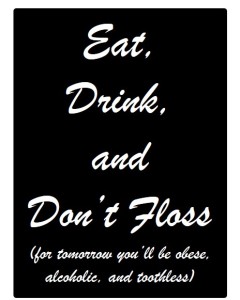Which of the following are bad for health and longevity?
A. Smoking;
B. Consuming too much alcohol;
C. Being overweight;
D. Not flossing regularly.
If you answered “yes” to any or all of the items, you are WRONG–that is, at least, if you are determined to rely on evidence derived from randomized controlled trials (RCT’s) alone in making healthcare decisions.
For some time now, RCT’s have been considered the “gold standard” for assessing evidence. That said, for reasons which are likely obvious to you, no scientist would ever conduct studies in which real people are randomly assigned to either smoke, drink excessively, overeat, floss. or not.
And yet, the Associated Press (AP) recently dismissed flossing because of the paucity of such trials. Their eye-catching headline?
Medical benefits of dental floss unproven
The story is worth reading. It has all the qualities of a John Grisham novel: (1) a corrupt government; (2) self-serving business executives; (3) professional organizations with serious conflicts of interest; and best of all (4) secret documents retrieved by valiant news reporters via the Freedom of Information Act. Seriously!
So, should you stop flossing? Of course not. Neither should you take up smoking, begin drinking excessively, or consumer many more calories per day than you burn. But, surely you knew that. For many living in the era of evidence-based medicine, however, no RCTs = no evidence. In fact, this is exactly the thinking behind many of the guidelines steering the practice of psychotherapy today.
Local, state, national, and international regulatory bodies place RCT’s at the top of the hierarchy of scientific methods, generating lists of “approved” methods. Increasingly, reimbursement and funding decisions are linked to practicing in accordance with these recommendations. The implicit message is clear. Where an RCT exists, no thinking on your part is required. Just do what you are told and all will be well.
Nothing could be further from the truth. No evidence exists showing that the widespread adoption of “psychological treatments of known efficacy“– that is, those tested in RCTs, deemed empirically-supported, and listed on regulatory websites — has resulted in any real-world improvement in outcome. In fact, the overall effectiveness of psychotherapy has remained unchanged for more than 40 years.
 Turns out, what does matter in terms of outcome is the very element of treatment that’s largely been pushed aside, even maligned, in current research environment: YOU!
Turns out, what does matter in terms of outcome is the very element of treatment that’s largely been pushed aside, even maligned, in current research environment: YOU!
In RCT’s, by contrast, the provider of treatment is literally considered a “nuisance variable” — an aspect of the process that must be controlled with protocols and blinding because they are “of no particular interest” to investigators.
Importantly, however, studies dating back decades show that who provides psychotherapy matters significantly more than what particular method or approach they use — 5 to 9 times more! It may be difficult to believe, but its true: even when following detailed treatment protocols, differences in outcome between therapists persist.
For consumers, the implication is clear: choose your provider carefully as they significantly influence the results of the care you receive. For therapists, it means that improving one’s effectiveness is not a matter of using the right treatment approach, but rather working on you; specifically, identifying your unique constellation of strengths and weaknesses, and building on the former while targeting the latter for remediation. In a series of ingenious studies, for example, clinicians realized significant gains in their ability to successfully manage challenging moments in psychotherapy when provided with feedback specific to their particular deficits and abilities. Importantly, participants ability to respond warmly, emphatically, and collaboratively not only improved, but also generalized to novel scenarios they had not encountered previously or been given time to rehearse.
My colleague Daryl Chow, Ph.D., and I will be providing step-by-step guidance as well as tools for mapping one’s clinical performance at the upcoming Deliberate Practice Intensive in Chicago. Here’s the description of what will be covered. I do hope you’ll join us. I promise two, personally meaningful days together with practitioners from around the world.
That said, there’s no reason to wait until then to get started. A year ago, I offered free access to several resources. If you didn’t see that post, no worries, simply click here as all are still available. To these, I’d like to add The Taxonomy of Deliberate Practice. Daryl and I have been using this tool to help clinicians see what they do that does and doesn’t work, as well as to develop an individual professional development plan. Just email me at: info@scottdmiller.com and I’ll send you a copy.
In the meantime, take a listen to this interview with Daryl from today. I know its going to sound like a “come on,” but trust me when I say listen all the way to the end as there’s a real gem in the last minute about improving your results as a therapist.
Scott
Scott D. Miller, Ph.D.
Director, International Center for Clinical Excellence




Great article! For those of us who use our personhood as part of the treatment, we salute you.
Thanks so much Stu!
I’m sure you’ve heard it before: Absence of evidence is not evidence of absence!
Yes, but not sure what your point is…
Come on, Scott! Back when I was in graduate school, I was told about the “grandma criterion” for picking a research topic. If your grandma would say, why spend time investigating that? Everyone already knows the answer! then maybe that’s not a good topic. The flossing, obesity, smoking, and alcohol topics are ridiculous examples. Do they really need RCTs? Also, what ethics board is going to let you give human subjects cigarettes or alcohol just to see if it has bad effects?
Do you really want to argue that we should not test new treatments to see if they work? Let’s do scream therapy and rebirthing therapy, as long as the therapist checks in with the client at the end of every session to see if they were attuned and on target then everything is good?
I am not necessarily a fan of all EBTs all the time but you even endorse the collection of data to inform one’s practice.
Anne, thanks for taking the time to write. Perhaps you could read the blog once again as the ridiculous nature of the examples I gave was purposeful. It was agreeing with your Grandma–some things do not need RCT’s to be accepted, including flossing (which, if you read the links, was hotly disputed by AP)! As for whether or not we need to test new psychotherapies in RCTs, 50 years of evidence indicates such treatments do not work like medicine. Instead, they show that other factors (like the therapist) are far more important than the model being used. Additionally, please note, in contrast to medicine NO psychological approach tested in an RCT to date has ever been shown to reliably cause deterioration. What does? Well, therapists…
Thanks for commenting Anne. I think you may need to re-read the post, as the examples I cited were chosen purposefully because they were ridiculous. In other words, I’m agreeing with your Grandmother: some things do not need to be tested in an RCT to be deemed established (including flossing, which was questioned, not by me, but by the AP. Take a moment and read the links). Psychotherapy, it turns out, does not work like medicine. More, 50 years worth of evidence that factors other than the treatment approach are far more important –factors like the therapist. By the way, NO psychological approach that has been tested in an RCT has ever been shown to reliably cause deterioration. What does? Therapists…
“We shook peoples confidence quite a bit”
Thank goodness – professional arrogance birthed in ideological ignorance is rampant in the New Zealand therapeutic environment- glad to see ethical humility being revealed in this work.
Either measure your outcomes and refine yourself towards excellence, or guess your outcomes, and live in a therapeutic la la land – there is no third alternative.
Hi Scott,
thats some good information on psychotherapy but if you want some more then visit my website for it.
https://www.inquiretalk.com/